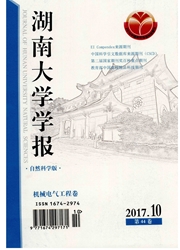

 中文摘要:
中文摘要:
利用MTS液压伺服高速试验机测试芳纶纤维(Kevlar29)增强复合材料(AFRP)在不同应变率(25,50,100和200S1)和温度(-25,0,25,50和100℃)条件下的力学性能.结果表明,在相同温度(25℃)下,随着应变率的增大,杨氏模量和拉伸强度先增大(25~50S-1)后减小(50~200S-1),而韧性则表现为相反的趋势.在相同应变率(25S-1)下,温度的升高会造成杨氏模量出现波动,拉伸强度上升,而韧性则没有明显的改变.不同试验条件下AFRP破坏形态没有明显区别,均为较平整断裂面.最后,通过weibull分析,量化了破坏强度在不同应变率和温度下的离散程度.
 英文摘要:
英文摘要:
Abstraet:Aramid fiber (Kevlar 29) reinforced polymers (AFRP) samples were tested by utilizing a MTS servo-hydraulic high rate testing machine in order to investigate their mechanical properties at different strain rates (25, 50, 100, and 200 s-1) and temperatures (-25, 0, 25, 50, and 100℃). The results show that at the same temperature (25℃), Young's modulus and tensile strength increase with the increase of strain rate firstly (25 to 50 s-1), and then decrease under the greater strain rate (50 to 200 s-l), while the opposite occurs for toughness. When strain rate is constant at 25 s-1 , Young's modulus shows a trend of fluctuation under elevated temperatures, while the tensile strength and toughness show no sub- stantial temperature effect. The failure patterns of AFRP samples were similar at the investigated strain rates and temperatures, and the fracture surfaces were relatively straight. Moreover, Weibull statistics were used to quantify the degree of variability in failure strength at different strain rates and temperatures. Key words: AFRP; tensile behavior; dynamic loading~ temperature effect ~ failure patterns
 同期刊论文项目
同期刊论文项目
 同项目期刊论文
同项目期刊论文
 期刊信息
期刊信息
